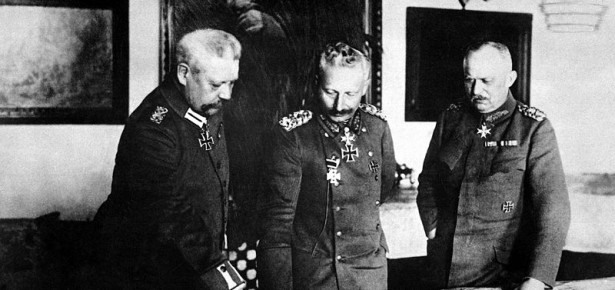
General Paul von Hindenburg, Kaiser Wilhelm II, and General Erich Ludendorff in 1917
Inevitably Kaiser Wilhelm II, German emperor, king of Prussia and Supreme War Lord, is in the forefront of the current very lively debate on the origins and nature of the First World War. Until about a year ago, historical scholarship had reached something of a consensus on the trajectory underlying German history from unification under Bismarck in 1871 to destruction under Hitler in 1945. In this generally accepted interpretation, the dynamic energy generated by the united Prusso-German empire at the heart of Europe was by the end of the nineteenth century perceived by its neighbours as an existential challenge to the European states system, to which first France and Russia and then Great Britain responded by drawing closer together, eventually to form the Triple Entente – a development regarded in Germany in turn as ‘encirclement’ and as an unacceptable constraint on her rightful future development. To have managed this burgeoning ‘German problem’ would have required exceptional wisdom, restraint and tact on all sides and particularly in Berlin, qualities which were spectacularly absent under the erratic personal military monarchy of Wilhelm II. The root cause of the First World War (and by extension of the Second World War too) was thus seen to lie in this fundamental conflict between Germany’s elemental drive for supremacy and the determination of Britain along with her continental partners to uphold the existing balance of power in Europe. The decision of the Kaiser and his military and civilian advisers to use the growing antagonism between the moribund multinational Habsburg Monarchy and her small irredentist South Slav neighbour Serbia in July 1914 as a pretext for a carefully prepared strike against first France and then Russia – all this had been meticulously documented and an international consensus reached.
In the past commemorative year this paradigm has been challenged by influential accounts of the origins of the First World War which tell a different narrative, preferring a horizontal (pan-European) rather than a vertical (Germanocentric) perspective in order to highlight the war-like tendencies present in all European societies by 1914, so focusing less on the intentions of the rulers in Berlin. It is as if, after fifty years of preoccupation with Germany’s (and to a lesser extent Austria-Hungary’s) responsibility for the catastrophe, these historians are returning to the interpretation favoured in the 1920s and 1930s that in the summer of 1914 the nations of Europe had unintentionally ‘slithered over the brink into the boiling cauldron of war’, as David Lloyd George famously put it in his memoirs.
Kaiser Wilhelm II was arguably the very last person who should have been entrusted with the immense powers of the Hohenzollern military monarchy at such a critical juncture in Germany’s and Europe’s history
These two versions of how and why the terrible European civil war of 1914-18 occurred are not entirely mutually exclusive, for of course the policies of Germany’s leaders cannot be understood in isolation. But still there remains an irreducible conflict between the two paradigms. The view that in July 1914 the Great Powers all stumbled unwittingly into war like sleepwalkers, none of them more culpable for the disaster than the other, is in the end irreconcilable with the view that the Kaiser and his paladins conspired with their allies in Vienna deliberately to begin a war with the aim of breaking out of the intolerable constraints of the so-called concert of Europe to establish supremacy on the Continent before it was too late. In this latter interpretation France, Russia, Great Britain and of course Serbia were fighting the war not for some incomprehensible reason but to safeguard their very existence, paying an unimaginable price in the process, as they were to do again in the 1940s. It is my contention that the ‘slithering’ into the First World War thesis can only be sustained by the deliberate omission or marginalisation of much cast-iron evidence to the contrary.
Kaiser Wilhelm II, imperious, impulsive, imbued with notions of the divine right of kings and of Germany’s God-given trajectory to greatness, while at the same time insecure and hypersensitive to slights to his imperial dignity or his dynastic mission, was arguably the very last person who should have been entrusted with the immense powers of the Hohenzollern military monarchy at such a critical juncture in Germany’s and Europe’s history. Nevertheless he stood at the apex of the Kaiserreich’s policy-making pyramid for thirty years, from his accession in June 1888 to his flight into exile in Holland in November 1918. All the generals and admirals, chancellors, ministers and ambassadors who served under him were appointed by him and dependent on his ‘All-Highest favour’. Wilhelm followed events at home and abroad with a nervous intensity which on occasions bordered on insanity, issuing orders and covering diplomatic dispatches with furious diatribes that have survived in their thousands in the archives. His own words and deeds mark him out as in many respects a forerunner of Adolf Hitler, not least in his vitriolic anti-semitism in exile. And it was of course he, Prussia’s Supreme War Lord, who, having on several occasions beforehand urged the Austrians to attack Serbia, gave the fateful order on 4 July 1914 that led to disaster.
Looking back at his own reign at the end of his life, the Kaiser in exile greeted Adolf Hitler’s conquest of Norway and Denmark, Holland, Belgium and France in 1940 as the fulfilment of his own supremacist ambitions. In jubilation he exclaimed to an American friend: ‘The brilliant leading Generals in this war came from My school, they fought under my command in the [First] Worlds War as lieutenants, captains and young majors. Educated by Schlieffen they put the plans he had worked out under me into practice along the same lines as we did in 1914.’ His words speak for themselves.
Latest Comments
Have your say!